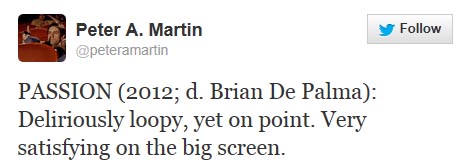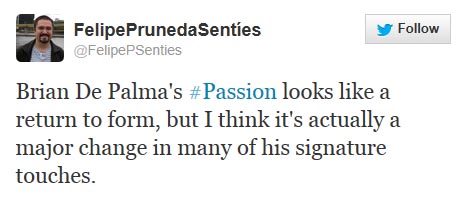'PASSION' REVIEWS & OTHER WRITINGS
LA TIMES ON DE PALMA & DANCING; FORCES OF GEEK IN DEFENSE OF 'PASSION'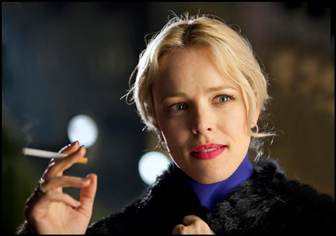
Here is another batch of links to reviews of
Passion, as well as an article from the
Los Angeles Times' David Ng about the dancing in some of
Brian De Palma's films. Of the ballet sequence in
Passion, Ng writes, "The spare production, in which a man and a woman approach and repel each other, is a ballet about the ballet, in much the same way as De Palma's movies have always been about the movies.
"
[Jerome] Robbins had his two dancers look directly at the audience, a deliberate attempt to break the fourth wall. De Palma replicates this by having the dancers --
Polina Semionova and
Ibrahim Oyku Onal of the Staatsballett Berlin -- look directly into the camera. (The split screen acts as a kind of theatrical proscenium.)
"Their direct gaze is the visual inverse of the action in the second half of the screen -- a grisly murder sequence shot from the point of view of an intruder, with the camera assuming the killer's eyes. The effect is twofold: On the left side of the screen, we are being watched; on the right, we are doing the watching."
Here are some other Passion reviews:
Todd Sokolove, Forces Of Geek ("In Defense of Passion")
"I've never been an apologetic Brian De Palma fan and I'm not about to start apologizing. Recognized and celebrated by many a film geek, and seemingly the entire country of France, De Palma makes polarizing films that often split audiences and critics down the middle. His latest release, Passion, is no exception. It's a kaleidoscope of the auteur's prominent themes and performed tricks. It too, is not for everyone. This new "erotic thriller" has current Rotten Tomatoes score of 36%, but I'd be willing to bet it only fuels DePalma's indifference. Passion presents some sly critique on technology's ability to make anybody an entertainment content creator. I highly doubt he cares about technology's influence on the anybody-can-be-a-film-critic world wide web."
Sokolove also advises to "watch for some great in-joke moments in Passion, including an exact reproduction of a set up from Psycho."
Noel Murray, The Dissolve
"Before Passion ends, De Palma comes through with two sequences (neither of which originated with Love Crime) that can stand among his best: one where Christine is stalked on half a split-screen while the other half shows a fourth-wall-breaking performance of The Afternoon Of A Faun, and another that wordlessly sends four characters in pursuit of each other inside and outside Isabelle’s apartment.
"That latter scene—Passion’s big finish—doesn’t make much literal sense, given what precedes it. The ending is a complete De Palma invention, serving as a loosely related epilogue to the main story, much like the codas De Palma added to his films Carrie and Dressed To Kill. The scene is also a complete hoot. Passion makes glancing comments about ethics, cronyism, and a corporate culture that encourages employees to be cutthroat so long as it helps the company, but as always with De Palma, he’s more riffing on these ideas than making coherent, illuminating statements. He’s primarily interested in choreographing masterful setpieces, where every camera move is precise and the tone is heightened to the point of being tongue-in-cheek.
"Which isn’t to say that Passion is empty. De Palma gets some comic mileage out of the differences between the extroverted, brightly attired Christine and the chillier Isabelle—who can’t even work up a convincing 'I love you' when she has to—which is a sly way of confounding the convention of the femme fatale. (Depending on the viewer’s perspective, the villain of Passion could be Christine, Isabelle, or even Isabelle’s sycophantic assistant Dani, played by Karoline Herfurth.)"
Joshua Brunsting, Criterioncast
"A film chock full of melodramatic twists and turns, this film may be as close to the cinematic manifestation of everything De Palma believes aesthetically, and in that this becomes one of De Palma’s liveliest and most engaging works in at least 20 years. And in that De Palma truly becomes this film’s guiding light and inarguably the most interesting and important factor. Lavishly shot by Jose Luis Alcaine, this piece of work truly seems to be De Palma working at not so much the height of his aesthetic powers, but getting down to the pure seemingly animalistic core of his appreciation for things like German expressionism and, especially, film noir. There are stunning sequences here of beautifully lit sets that seem ripped right out of the cake noir that is Fritz Lang’s Ministry Of Fear, that film’s energy and aesthetic vitality seemingly injected straight into De Palma’s DNA. We also get various handheld sequences and seemingly first person shots that De Palma has been working with since his masterpiece, Blow Out, and even finding De Palma giving love to his key calling card, the brazen aesthetic shocker that is then split diopter shot. Passion is, at its very best, a stunningly shot meditation on the style of film noir, giving a deliciously De Palma sense of eroticism to things that would have become perfect fodder for a filmmaker like the aforementioned Lang."
Ray Pride, New City Film
"From reel to reel, Passion plays less like a succession of expected De Palma setpieces, than as individual, shorter films, each in their own volatile, sometimes clumsy fashion."
Rene Rodriguez, Miami Herald
"In Passion, Brian De Palma attempts to bring his trademark style of psycho-sexual thrills to the arena of corporate politics. The result is a ridiculous but entertaining mess. The movie teeters on the edge of camp for awhile, then plunges in headlong."




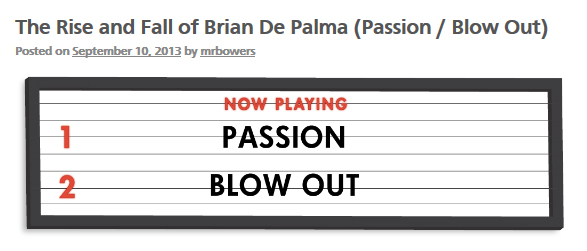

 Here is another batch of links to reviews of Passion, as well as an article from the
Here is another batch of links to reviews of Passion, as well as an article from the 
 On "The Week's Best Sound Bites" page of its current issue (September 13, 2013, with Breaking Bad on the cover),
On "The Week's Best Sound Bites" page of its current issue (September 13, 2013, with Breaking Bad on the cover), 


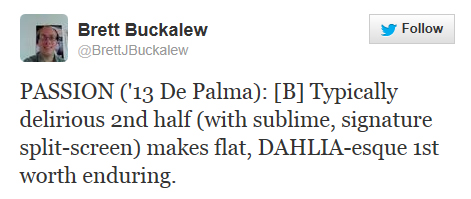
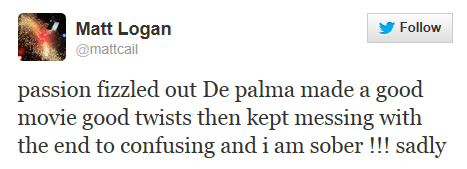
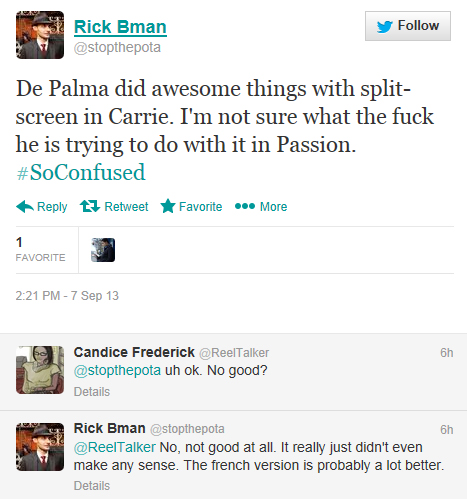
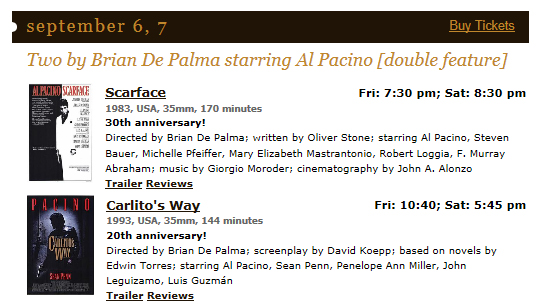
 In his "Box Office Rap" column,
In his "Box Office Rap" column, 